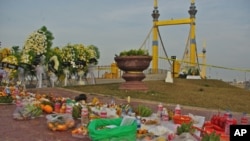Although victims' families in the Diamond Bridge stampede have received some compensation, they also have the right to file formal complaints, an independent lawyer said Thursday.
“We have not seen people and victims exercise their legal rights after the tragedy,” said Kao Supha, as a guest on “Hello VOA” Thursday.
The bridge stampede left 352 dead, including one man who succumbed to his injuries in a hospital on Thursday, raising questions of official responsibility.
“People should become complainants, and also the [court] prosecutor should do a preliminary investigation over this case,” Kao Supha said.
Victims' families are expected to receive up to $12,000 in compensation from the government, the developers of Diamond Island and private donors. But a government committee said the bridge disaster was not the fault of any body or agency.
Government spokesman Phay Siphan said victims have the legal right to pursue a case, but added no one should be punished “in the unintentional incident.”
Yong Kim Eng, director of the People's Center for Development, who was also a guest on “Hello VOA,” said people will need a proper explanation for the incident or lack confidence in the safety of future activities.
“The Cambodian government has fulfilled some of its obligations, but people still have the right to know what the real cause of the tragedy was,” he said.
Authorities now need to consider their response to the bridge stampede, which was sparked when thousands of people crowded on a single bridge panicked when it began to sway, he said. A faster response could have saved the lives of some, he said.
By law, the state has an obligation to protect people and ensure public order, especially during an event like the massive Water Festival, where millions of people descend on the capital for several days of revelry.




